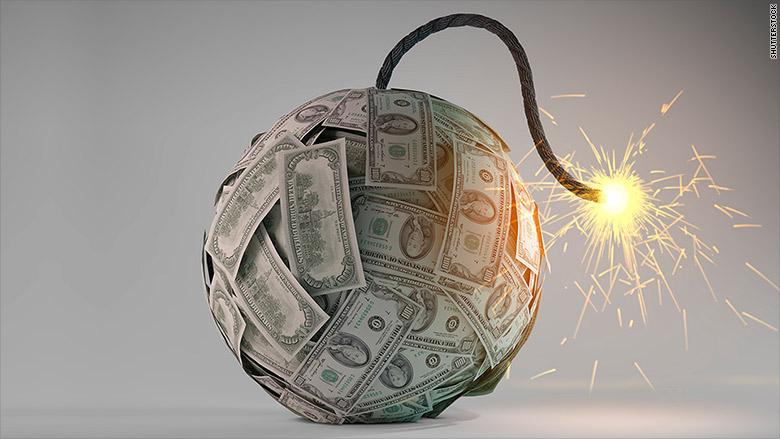
Junk bonds have been investors' snack of choice over the past five years. They may soon regret that decision.
Billionaire Jeffrey Gundlach believes the next crisis will be in junk bonds. His voice is worth listening to. Not only is Gundlach the so-called king of the bond markets, but the CEO of DoubleLine Capital correctly predicted the subprime crisis that sparked the Great Recession last decade.
Junk bonds, also known as high-yield debt, have been among the biggest beneficiaries of the Federal Reserve's unprecedented moves since the financial crisis. The central bank kept interest rates near zero, forcing investors who need to earn a regular income to take a gamble on junk bonds because the interest rates on U.S. government bonds are so low right now.
"They've been searching for yield and throwing caution to the wind," Gundlach said over the weekend during an appearance on Wall Street Week, a long-running weekly financial TV show that was recently resurrected.
Related: The U.S. economy isn't growing fast enough
The problem: The junk bond market will soon face a double whammy: higher interest rates and a "wall" of maturities. The Fed is expected to begin raising rates later this year or early next. That's not very long before investors will start focusing on the combined $600 billion of junk bonds set to mature in 2018 and 2019.
Gundlach warns this could lead to a run on bond funds. All it would take is a small spark to cause investors to worry and run for the exits as they fear higher interest rates will make it harder for companies to "roll over," or refinance, that debt.
Investors want to get paid. Any sign of higher defaults will be alarming.
"The ultimate consequence of all of these extreme policies have yet to be felt -- but will be felt," he said.
Related: Bonds are much riskier than you think
Junk bonds are newbies: No one knows exactly how the junk bond market will react to rising interest rates because it's never really experienced them before. The market didn't start to gain popularity until the mid-1980 when rates were far higher.
"The entire life of the junk bond market has been during secularly declining interest rates. It's like a summer insect. You can't talk about ice with a summer insect," Gundlach said.
Gundlach isn't the only one sounding the alarm about the bond markets.
Earlier this month JPMorgan Chase (JPM) CEO Jamie Dimon joined a slew of other smart people on Wall Street worried about liquidity in the fixed income market due to new regulations installed after the last crisis. During a panic there may not be enough bonds available to go around, Dimon argued.
Related: Bond king: Stop being 'cute' and buying energy stocks
Crisis would hurt real people, not just billionaires: All of this matters to mom-and-pop investors for several reasons.
Many investors have exposure to high-yield debt through their 401(k) plans. Average Joe's have also been putting a lot of money into echange-traded funds, or ETFs, that track junk bonds. The best example is the iShares iBoxx USD High Yield Corporate Bond ETF (HYG), which has nearly $17 billion of assets.
A lot of people could get squeezed if the junk bond market dries up. It would also hurt the broader economy.
Malls face 'secular death spiral' The good news is Gundlach doesn't believe a junk bond crisis will happen tomorrow. He said it's okay for investors to own high-yield bonds for now -- but warns a disaster could be in the cards between a year and two years from now.
In the meantime, Gundlach is advising people to stay away from certain sectors of the stock market that have benefited from investors' hunt for yield.
He specifically pointed to Master Limited Partnerships, or MLPs. These are complicated enterprises that pay out fat dividends but are heavily leveraged. When rates rise, their profit margins can collapse.
Gundlach also isn't a fan of mall REITs, or real-estate investment trusts, which have performed well because they are required to return a huge chunk of their profits to investors as dividends. Mall owner General Growth Properties (GGP) is actually the best S&P 500 stock of the entire bull market.
"We're in a secular death spiral for malls," Gundlach said.


